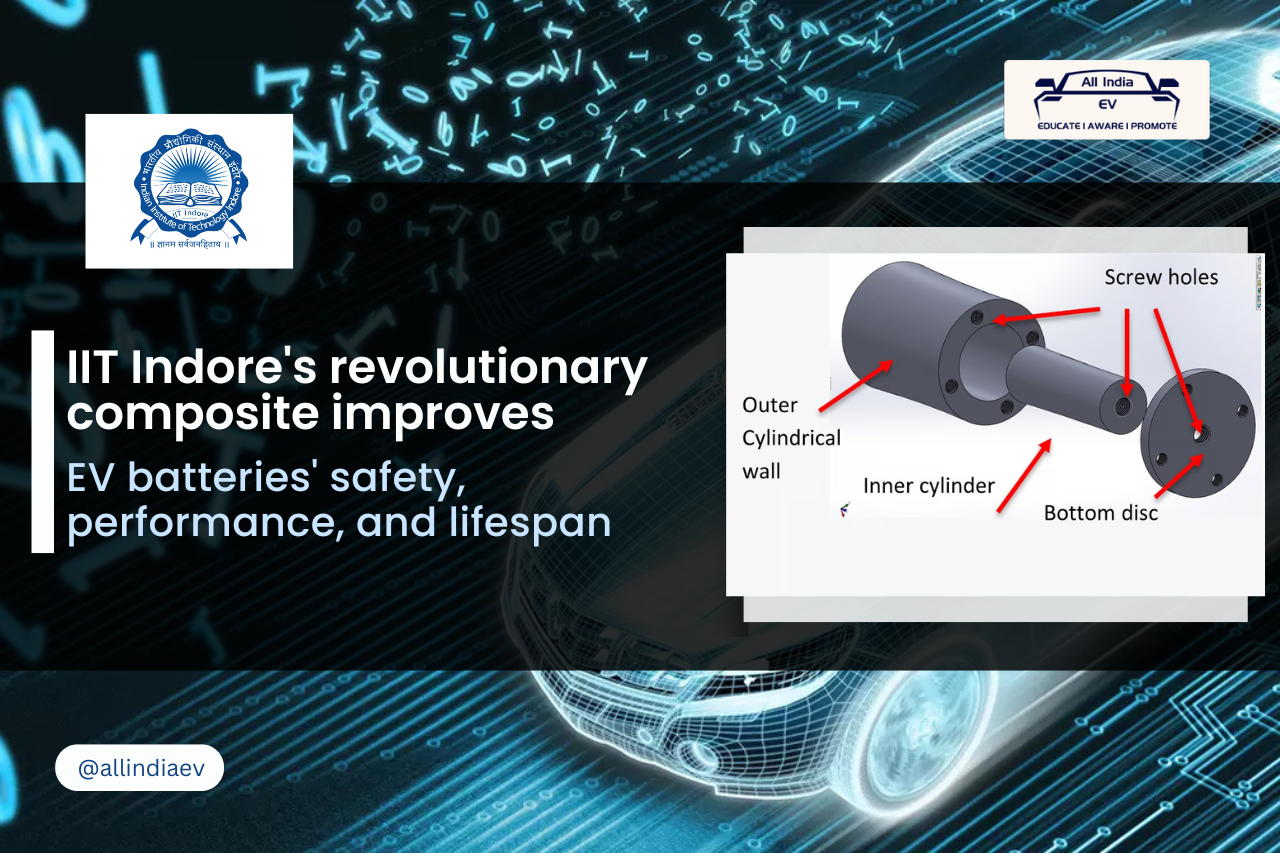
IIT Indore Revolutionizes EV Batteries with Advanced Composite
In a major breakthrough for the electric vehicle (EV) industry, researchers at IIT Indore have developed a revolutionary Novel Phase-Change Composite (NPCC) that promises to significantly improve the thermal management of lithium-ion batteries used in electric vehicles. Spearheaded by Prof. Santosh Kumar Sahu from the Mechanical Engineering department, this cutting-edge composite offers enhanced battery safety, performance, and lifespan, addressing some of the most pressing challenges in EV technology today. As battery efficiency, safety, and durability are key concerns for the EV market, the NPCC has the potential to drive a new wave of innovation in the sector.
The material is lightweight, cost-effective, and easy to manufacture, making it a promising alternative to traditional cooling systems that are often bulky and maintenance-heavy. This breakthrough technology not only holds the potential to advance EV battery systems but also finds applications in renewable energy storage and other sectors requiring superior thermal management solutions. The NPCC is already moving towards commercialization, with Simple Energy Private Limited in Bangalore set to integrate it into their electric two-wheelers.
The Role of Thermal Management in EV Battery Safety
Effective thermal management is a critical aspect of electric vehicle (EV) design, as it directly impacts the performance and safety of the battery system. In lithium-ion batteries, excessive heat can cause irreversible damage, leading to thermal runaway, a process that can result in fires, explosions, or battery failures. The Novel Phase-Change Composite (NPCC) developed by IIT Indore addresses this issue by ensuring that battery temperatures remain stable and within optimal ranges during both charging and discharging cycles.
This stability prevents the battery from overheating, reducing the risk of catastrophic failures. The NPCC acts as a heat sink, absorbing excess heat and maintaining a uniform temperature across the battery module, thereby ensuring safer and more reliable operation. Unlike traditional liquid-cooled systems that often require pumps, pipes, and constant maintenance, the NPCC offers a passive solution that is both efficient and easy to manage.
Key Advantages of NPCC in EV Battery Applications
The NPCC introduces several critical advantages over traditional battery cooling methods. Some of its key benefits include:
- Improved Thermal Conductivity: The NPCC ensures that heat is efficiently distributed across the battery, preventing hotspots that could damage individual cells or cause performance degradation.
- Shape Stability: The composite maintains its structure under varying conditions, ensuring consistent thermal management over time without deformation.
- Flame Resistance: An important safety feature, the NPCC offers flame-retardant properties that protect the battery from fire hazards in case of extreme heat buildup.
- Electrical Insulation: The material is designed to insulate against electrical currents, minimizing the risk of short circuits and enhancing the overall safety of the battery system.
- Lightweight and Cost-Effective: Unlike traditional liquid cooling systems, the NPCC is lightweight, reducing the overall weight of the EV, while also being more cost-effective and easy to manufacture.
By addressing both performance and safety concerns, the NPCC presents a significant leap forward in battery technology, offering a more reliable, durable, and safer alternative to current thermal management solutions.
Impact of NPCC on EV Manufacturers and Consumers
The introduction of NPCC technology is set to bring about profound changes for both electric vehicle manufacturers and consumers. For manufacturers, the new composite offers several operational advantages, such as reducing the complexity and cost associated with traditional cooling systems. Since the NPCC eliminates the need for heavy pumps, pipes, and other cooling components, manufacturers can save on material and maintenance costs, leading to overall cost savings and higher efficiency in production. Additionally, NPCC’s efficiency in regulating temperature enhances the battery’s performance and longevity, leading to fewer battery replacements and lower maintenance costs for consumers.
For consumers, this innovation promises longer-lasting batteries, resulting in a reduction in the frequency of battery replacements, a key concern in the EV industry. The longer lifespan of the battery will also make EVs more cost-effective in the long term, reducing the total cost of ownership. As the NPCC ensures greater battery safety, it will provide consumers with added peace of mind, particularly with regard to the risks associated with overheating and thermal runaway. The technology’s contribution to environmental sustainability by reducing waste and the need for raw materials further strengthens its value proposition, making EVs more attractive as a sustainable and reliable transportation option.
Commercialization and Broader Applications of NPCC Technology
The commercialization of the NPCC technology has already begun, with Simple Energy Private Limited in Bangalore securing the rights to integrate it into their electric two-wheelers. This collaboration marks the first step in bringing the technology to market, and it is expected to extend to other EV manufacturers in the future. As the demand for electric vehicles continues to grow globally, the NPCC’s ability to enhance battery efficiency and lifespan makes it an attractive solution for companies looking to improve their EV offerings.
Beyond the EV sector, the NPCC also has wider applications in industries where thermal management is crucial. For example, it could play a significant role in renewable energy storage systems, where it would be used to maintain the stability and safety of energy storage devices. In addition, industries such as consumer electronics, telecommunications, and industrial applications that rely on batteries and require efficient thermal management could benefit from the use of NPCC. By enabling safer, longer-lasting, and more efficient battery systems, the NPCC could contribute to the development of sustainable technologies across various sectors, reducing dependence on fossil fuels and helping to combat climate change.









